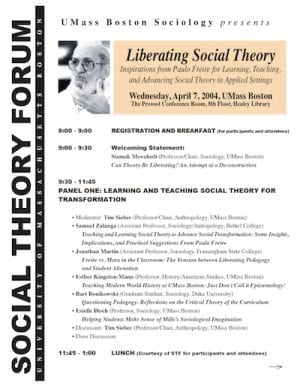Proceedings Journal Article — Freire vs. Marx: The Tension Between Liberating Pedagogy and Student Alienation — by Jonathan Martin
$15.00
In this paper I describe the tension between Freirean concept of pedagogy and Marxist concept of alienation in the U.S. educational context, with special reference to my own experience teaching at a working class state college in Massachusetts.
Description
Abstract
“Freire vs. Marx: The Tension Between Liberating Pedagogy and Student Alienation” is authored by Jonathan Martin.
“In this paper I describe the tension between Freirean concept of pedagogy and Marxist concept of alienation in the U.S. educational context, with special reference to my own experience teaching at a working class state college in Massachusetts.
“Subsequently, I discuss other Marxian ideas that can be useful in theorizing a way out of the alienation trap. Specifically, I explain how the notion of revolutionary agency set forth by Marx andespecially the complex conceptions of revolutionary strategy and popular political consciousness developed by Italian Marxist Antonio Gramsci suggest that the alienation pitfall may not be as serious as we might think.
“I refer to my teaching experiences to illustrate and corroborate this point.”
Recommended Citation
Martin, Jonathan. 2004. “Freire vs. Marx: The Tension Between Liberating Pedagogy and Student Alienation.” Pp. 27-32 in Liberating Social Theory: Inspirations from Paulo Freire for Learning, Teaching, and Advancing Social Theory in Applied Settings: Proceedings of the First Annual Social Theory Forum, April 7, 2004, UMass Boston (Discourse of Sociological Practice, Vol. 6, Issues 2, Fall 2004). Issue Guest Editor: Mohammad H. Tamdgidi. Sociology Department, UMass Boston.




